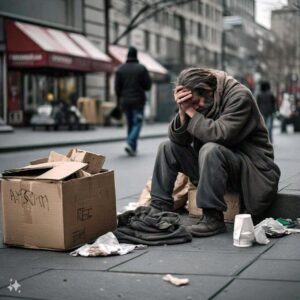Homelessness and mental health
Homelessness, sometimes leads to poor mental health. The pressure of facing homelessness can worsen previous mental health issues and encourage substance use, fear, anxiety, sleeplessness, and depression.
Needs of people having mental health problems or those without mental health illness who experience homelessness are same such as physical safety, transportation, education, affordable medical or dental treatment and affordable housing. It is necessary to create a supportive and non-threatening environment, provide available care and address essential needs such as food and shelter, when providing care to those who are homeless.
In this article, we have discussed the relationship between homelessness and mental health and many mental health issues among homeless people.

Statistics on homelessness and mental health
Homelessness is a rising issue in the UK. Studies show that there is a close relation between homelessness and mental health problems.
- In 2014, it is reported that 80% of people who are homeless in England had mental health issues, while 45% people have been diagnosed with a mental health condition.
- Studies show that there is a higher prevalence of mental health problems in the homeless population as compared to the general population, which includes schizophrenia, major depression, and bipolar disorder. Statistics recommend that the prevalence of mental health issues in this population should be 25 to 30% of street homeless in any case.
- In England, the most common health issues among homeless people are substance abuse (62.5%), mental health issues (53.7%) and a combination of these two (42.6%). These issues are usually linked with homelessness. They should add more costs to homelessness because of the need for social care support and health.
- As with many marginalized groups, the correlation between homelessness and mental health should be two ways. Majority of homeless people have mental health disorders as a reason for being homeless. 26% of house-less people in the UK have mental health problems due to being homeless.
Mental health issues among people who experience homelessness
Homelessness is associated with poor mental health outcomes which may trigger certain types of mental health disorders, such as:
- Depression
- Bipolar disorder
- Schizophrenia
- Anxiety disorders
- Substance abuse disorders
- Sleeplessness
- Fear
These are the most common mental health disorders in homeless people.
Connection between homelessness and mental health issues
Many researchers admit that there is a complex and two-way relationship between homelessness and mental health issues. Mental illness of a person may lead to behavioral and cognitive problems which make it tough to achieve daily activities and earn in a way that supports stable housing.
Most researches have shown that, people with mental health disorders are often homeless basically because of lack of less-income housing and poverty. The combination of homelessness and mental health issues also causes other problems which includes higher levels of drug abuse and alcohol. Children facing homelessness are at the danger of behavioral and emotional problems and people who are homeless, sometimes also dealing with their childhood trauma.
Can homelessness worsen existing mental health problems?
Some studies show that the homelessness may be a traumatic event which affects symptoms of mental health issues in a person. If someone is homeless and spends most of time homeless, there are chances that he may have increased levels of alcohol use and psychiatric distress and lower levels of recovery with previous mental health disorders.

Can homelessness and mental health issues in a person influence interactions with the justice system and police?
Generally, homelessness and mental health problems in people may lead to many encounters with courts and police. For example, there are higher rates of connection with the victimization and criminal justice system among homeless people who have severe symptoms like psychosis, than among housed people having severe mental health disorders. Homeless people having mental health issues who faced neglect or abuse in their childhood have more chances to be arrested as the victim of a crime and committing crime .
Homelessness affect mental health issues within families
One of the largest effects of homelessness on mental health issues comes through its impact on mothers of families. For example, mothers who face postpartum depression during the 1st year after the birth are at increased risk for homelessness or the factors which lead to homelessness for instance, frequent or evictions moves in two to three years after the year of postpartum.
One of the largest studies of homelessness and children(17 thousand children in Denmark) found that the higher frequency of psychiatric disorders, which include substance abuse, among children with mother or both parents having a history of homelessness.
Kinds of interventions that help people with mental health issues facing homelessness
There are many programs which provide long-term stable housing for individuals with mental health issues, and can help to upgrade mental health problems. These programs include reducing the total number of visits to the mental health institution or inpatient psychiatric hospitals. A study in 2015 concluded that the services which deliver social and cognitive skill training, usually in developing or maintaining relationships, may be useful in supporting people with mental health issues and homelessness get back housing.
Summary
Homelessness leads to many mental health issues. There is a close connection between homelessness and mental health disorders. It may worsen existing mental health disorders.
Homelessness can be reduced if people with extreme mental health issues were able to access housing and other basic community support. Housing services that provide safe places for people to live plays an important role in stabilizing mental health issues and helping individuals to recover.
